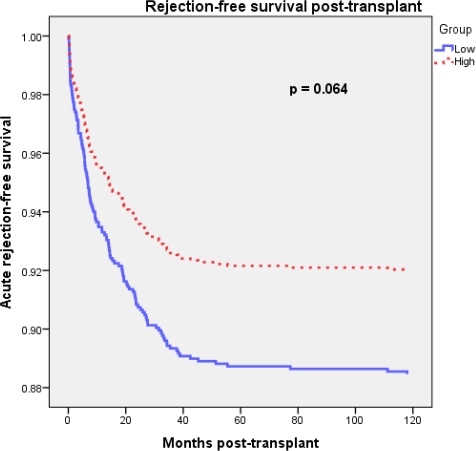Vitamin D Supplementation and Acute Rejection Following Kidney Transplantation
1Barnes-Jewish Hospital, St. Louis, MO
2Washington University in St. Louis, St. Louis, MO.
Meeting: 2015 American Transplant Congress
Abstract number: D161
Keywords: Kidney transplantation, Rejection
Session Information
Session Name: Poster Session D: Kidney: Acute Rejection
Session Type: Poster Session
Date: Tuesday, May 5, 2015
Session Time: 5:30pm-6:30pm
 Presentation Time: 5:30pm-6:30pm
Presentation Time: 5:30pm-6:30pm
Location: Exhibit Hall E
Purpose: Low serum levels of vitamin D have been associated with deleterious effects post-transplantation, including increased risk of rejection. Low serum vitamin D levels are common in ESRD patients. Our institution provides high-dose vitamin D supplementation to patients during the initial transplant hospitalization irrespective of baseline level. We aimed to determine the effects of this practice on rates and severity of rejection and renal function.
Methods: This was a retrospective cohort analysis of post-kidney transplant recipients transplanted between 2008 and 2014. We separated patients into groups based on whether or not they received >50,000 units of ergocalciferol during the immediate post-transplant period. Our primary outcome was risk of acute rejection (AR). Secondary outcomes included acute cellular (ACR) and antibody mediated rejection (AMR) and graft function at 1 and 2 years.
Results: 1418 patients were included in the study, with 1171 patients receiving >one dose (high) and 247 receiving one or fewer doses (low). The median number of doses were 0 vs 3.4. There were no differences between groups with regards to age, sex, race, cause of renal disease, cold or warm ischemia time, induction, or maintenance immunosuppression. There was a trend for lower incidence of AR in the high group (7.8 %) compared with the low group (11.3 %), p = 0.061. There was a significantly lower rate of AR at 1 year in the high group (4.5% vs. 7.4%, p = 0.045). While there was no difference in AMR, there was a trend for less ACR in the high vs low group (5.6% vs. 8.5%, p = 0.077). There was a lower risk of more-severe rejection (Banff >2A), in the high vs low risk group (1.4% vs 3.3.%, p = 0.037). There was no difference in eGFR between groups at years 1 (59 vs. 60, p = 0.18) and 2 (58 vs 60, p = 0.226).
There was a significantly lower rate of AR at 1 year in the high group (4.5% vs. 7.4%, p = 0.045). While there was no difference in AMR, there was a trend for less ACR in the high vs low group (5.6% vs. 8.5%, p = 0.077). There was a lower risk of more-severe rejection (Banff >2A), in the high vs low risk group (1.4% vs 3.3.%, p = 0.037). There was no difference in eGFR between groups at years 1 (59 vs. 60, p = 0.18) and 2 (58 vs 60, p = 0.226).
Conclusion: Although our findings were clinically but not statistically significant, likely due to power, high dose vitamin D administration early post-kidney transplant appears to reduce the risk of AR, and the severity of ACR. The exact mechanism by which this occurs needs further investigation.
To cite this abstract in AMA style:
Horwedel T, Botkin K, Hagopian J, Bowman L, Brennan D. Vitamin D Supplementation and Acute Rejection Following Kidney Transplantation [abstract]. Am J Transplant. 2015; 15 (suppl 3). https://atcmeetingabstracts.com/abstract/vitamin-d-supplementation-and-acute-rejection-following-kidney-transplantation/. Accessed February 15, 2026.« Back to 2015 American Transplant Congress
